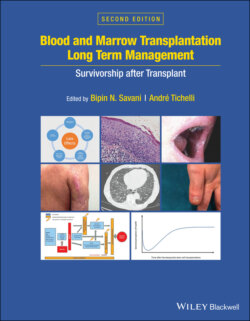Читать книгу Blood and Marrow Transplantation Long Term Management - Группа авторов - Страница 141
Neurocognitive
ОглавлениеIn this domain, the two key late effects to consider in practice are cognitive deficits with or without leukoencephalopathy, and peripheral neuropathies. The former can manifest as concentration difficulties with delayed developmental milestones and learning difficulties. Risk factors include high‐dose TBI ± additional cranial irradiation, CNS‐penetrant chemotherapies including busulfan, fludarabine, cytarabine, methotrexate, thiotepa, intrathecal agents as well as calcineurin inhibitor (CNI) therapy for GVHD. As a rule of thumb, full‐dose TBI (≥12 Gy) in a child <4 years old will drop IQ by approximately 10 points. In practical terms, if this child had average IQ before HCT, they could drop to low average IQ (with vocational limitations), whereas if a child starting at low‐average might drop to borderline and subsequently be suited for manual labor or have no job options. Cranial boost irradiation amplifies the risk for cognitive impairment. Hearing loss can contribute to cognitive impairment and is associated with cranial radiation doses ≥30 Gy. Platinum therapy used pretransplant or for HCT conditioning (e.g. high‐risk neuroblastoma) can cause hearing loss accompanied by tinnitus and vertigo (see Table 8.1).
Glucocorticoids can cause a variety of cognitive effects including mood disturbances that can be problematic for patients. Infection with HHV6, HSV, VZV, CMV toxoplasmosis and JC virus generally needs exclusion in cases of post‐HCT cognitive decline. Underlying diseases like FA, DC, Hurler syndrome, ALD, SCID and SCD may have pretransplant neurologic deficits that may stabilize or progress after HCT (see Table 8.1 for screening advice).
Peripheral neuropathy can be a chief complaint for some survivors and etiologies frequently include pre‐HCT neurotoxic chemotherapies like vincristine, platinum agents, or brentuximab, and posttransplant CNI therapy can exacerbate. Management of painful dysesthesias can be difficult but use of gabapentin or pregabalin is often considered.
